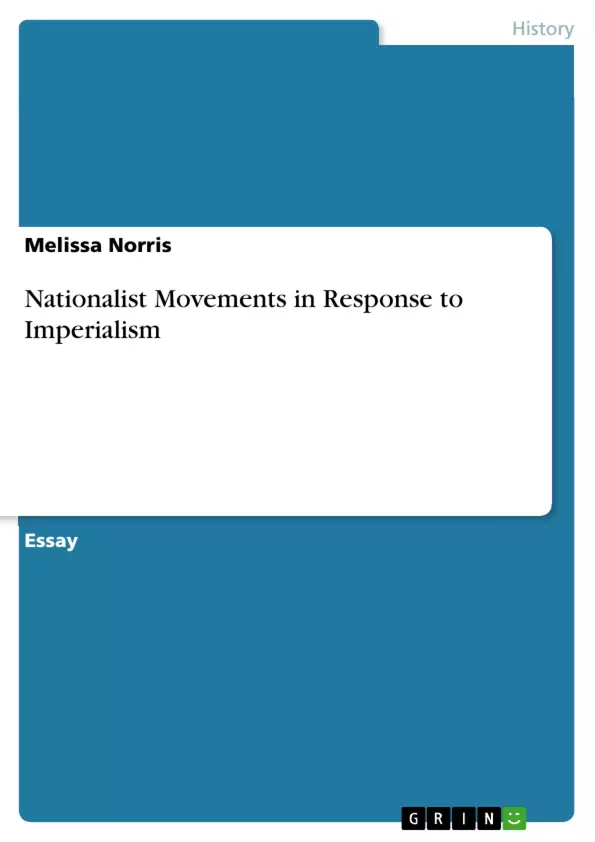The human rights violations that went on prior to World War I and between World Wars I and II until the end of World War II gave rise to Nationalist Movements. The Post-war response was for people to fight for their liberty from the particular Empires which were governing them and oppressing the natives.
After World War II, the United Nations was formed. This was due to people being oppressed by Imperialists prior to the war. The United Nations was to protect the rights of people in the colonies.These were rights to education, to have their own political institutions, and to have their social practices respected.There was a distinct movement for decolonization throughout the world during this time.
Inhaltsverzeichnis (Table of Contents)
- The United Nations and the Movement for Decolonization
- The Vietnamese Declaration of Independence
- The Fifth Pan-African Congress
- George Orwell and Imperialism
- The Legacy of Oppression and the Rise of Nationalist Movements
Zielsetzung und Themenschwerpunkte (Objectives and Key Themes)
This text explores the historical context and impact of decolonization movements following World War II. It examines the role of the United Nations in promoting human rights and self-determination, and investigates the experiences of various colonized populations in their struggles for independence.
- The role of the United Nations in promoting human rights and self-determination
- The experiences of colonized populations in their struggles for independence
- The legacy of colonialism and its impact on post-colonial societies
- The role of individuals in challenging oppressive systems
- The impact of the Cold War on decolonization movements
Zusammenfassung der Kapitel (Chapter Summaries)
- The United Nations and the Movement for Decolonization: This section discusses the formation of the United Nations and its role in promoting human rights and self-determination in post-World War II colonies. It highlights the emergence of a global movement for decolonization and the growing demand for independence among colonized peoples.
- The Vietnamese Declaration of Independence: This section focuses on the Vietnamese struggle for independence from French colonial rule. It examines Ho Chi Minh's leadership, the Declaration of Independence of the Democratic Republic of Vietnam, and the broader context of Vietnamese resistance to Japanese occupation.
- The Fifth Pan-African Congress: This section explores the Pan-African Congress and its call for an end to colonialism in Africa. It examines the delegates' demands for self-determination, the use of force to achieve independence, and the historical context of African resistance to colonial rule.
- George Orwell and Imperialism: This section analyzes George Orwell's essay, "Shooting an Elephant," which explores the moral dilemmas faced by individuals operating within an oppressive colonial system. It examines Orwell's personal experience as a police officer in Burma and his perspective on the impact of imperialism on both the colonizers and the colonized.
Schlüsselwörter (Keywords)
This text focuses on the themes of decolonization, human rights, self-determination, imperialism, colonialism, nationalism, and the legacy of oppression. It examines the experiences of colonized populations, including the Vietnamese, African, and Burmese, and their struggles for liberation from imperial rule. Key concepts discussed include the role of the United Nations, the impact of World War II, and the moral dilemmas faced by individuals operating within oppressive systems.
Frequently Asked Questions
What led to the rise of Nationalist Movements after World War II?
Widespread human rights violations and oppression by imperial powers prior to and during the World Wars motivated colonized people to fight for their liberty and self-determination.
What was the role of the United Nations in decolonization?
The UN was formed to protect the rights of people in colonies, including rights to education, political institutions, and the respect of social practices, fostering a global movement for independence.
What is the significance of the Vietnamese Declaration of Independence?
Led by Ho Chi Minh, it represented a major struggle for independence from French colonial rule and resistance against Japanese occupation.
What was discussed at the Fifth Pan-African Congress?
The congress called for an end to colonialism in Africa, demanding self-determination and even the potential use of force to achieve liberation from imperial rule.
How did George Orwell view imperialism?
In his essay "Shooting an Elephant," Orwell explored the moral dilemmas and the oppressive nature of the colonial system, reflecting on how it negatively impacted both the colonizers and the colonized.
- Citation du texte
- Melissa Norris (Auteur), 2021, Nationalist Movements in Response to Imperialism, Munich, GRIN Verlag, https://www.grin.com/document/1066495



